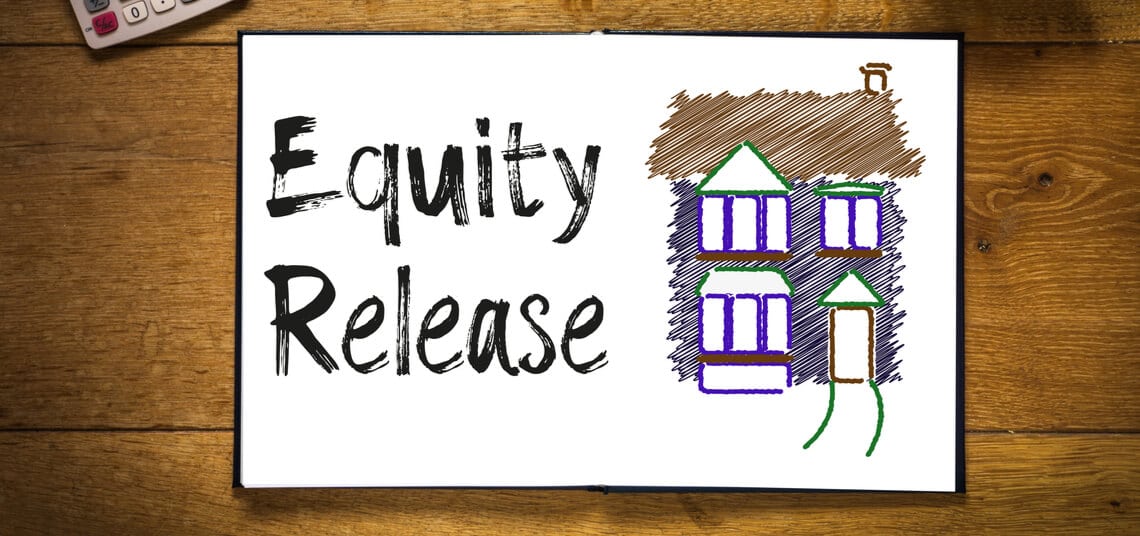Releasing equity from the main property you live in could be an effective way to raise cash later in life. But while equity release may suit some people, it’s not advised for everyone and can be very expensive. Here, we’ve got everything you need to know about releasing equity from your home.
What is equity?
For example, let’s imagine that you put down a 10% deposit on a property and pay off a mortgage over 30 years.The amount of equity you own over time might look a little like this…
| Equity | Mortgage | |
| Year 0 | 10% | 90% |
| Year 10 | 44% | 66% |
| Year 20 | 63% | 36% |
| Year 30 | 100% | 0% |
You’ll own a larger portion of the value of the property as you make more payments.
In reality, the value of the property will likely increase. This is called capital appreciation and it increases the amount of equity you own at a greater rate, because the portion of the property that’s covered by the mortgage will shrink at a faster rate.
Here’s another example…
Property value | Mortgage | Mortgage as % of property value | |
Year 0 | £300,000 | £270,000 | 90% |
Year 10 | £447,249 | £197,286 | 44% |
Year 20 | £666,774 | £108,474 | 16% |
Year 30 | £994,049 | £0 | 0% |
*Assumes property value increases by 4% per year, and a 30 year mortgage with an average interest rate of 2%
What is equity release?
So, equity is the portion of your property that you own outright. And as we’ve seen, you gain equity over time as the value of your property increases and your mortgage decreases.
But once you reach the age of 55, you can decide to convert some of that equity – ie. the portion of the property that you own outright – into cash.
This process is called equity release, and it’s usually done in one of two ways.
Home reversion scheme
This effectively involves selling a portion (or all) of the property to a bank or other financial institution, while continuing to live in it rent- and mortgage-free.
This can be done in one go, so that you receive a lump sum of cash upfront. Or it can be done in regular instalments, where the bank will pay you an agreed amount on a monthly basis for the rest of your life. You could even mix these two options.
When the property’s sold, the bank will receive a portion of the sale.
For example, if you release 20% of equity in the property, the bank will receive 20% of the sale price when the property’s eventually sold.
However, a major downside of this scheme is that in order to release equity, you have to sell a portion of the property at less than its market value. And this can be as little as 20%, depending on your age.
So if your property’s market value is £300,000 and you sell 20% using a home reversion scheme, you may receive £12,000 (20% of 20%) rather than it’s true market value of £60,000.
When the property’s sold or you pass away, the bank will receive it’s share of the proceeds at the true market value.
The gap between the equity release sale price and the market value sale price is due to the bank taking on risk and not knowing whether the property will go up in value or when it will be sold.
Lifetime mortgages
If you don’t have a mortgage on your property, and you’re over 55, you may be eligible to take out a lifetime mortgage.
This involves taking on a new mortgage where, instead of repaying it each month – like a regular mortgage – the loan is repaid when the property is sold or you pass away.
Lifetime mortgages loan you money at a fixed interest rate, meaning that the amount you pay back will be more than the amount you borrow.
For example, if you borrow £30,000 against your property at an interest rate of 5%, your estate would need to pay £51,379 if you died 20 years later.
You may be able to pay back the interest as you go along, limiting the effects of compound interest – where interest is charged on interest, increasing the repayable loan amount at a faster rate over time.
Lifetime mortgages are protected against negative equity. So if your property loses value after taking out the loan, you won’t be charged a penalty.
Lifetime mortgages tend to be more popular than home reversion schemes. But a key downside is that, if you don’t plan on selling before you die, and you end up living for a very long time, the repayment amount could grow to be so large that there could be little equity left to pass on to your family when they come to sell the property.
The pros and cons of equity release
Equity release is most popular with people who are retired or approaching retirement.
Releasing equity when you’re older can have some benefits:
- Boost your retirement income with a cash lump sum or regular payments
- Tap into an emergency cash reserve should big expenses arise, like healthcare
- There’s no need to downsize or sell up to free up additional cash
- There’s no tax to pay on cash freed up from your property
- You can choose how much of your property to sell, leaving you with some equity
However, there are some downsides:
- It’s very expensive to get out of an equity release arrangement
- Interest on lifetime mortgages could grow so large that there’s little left to pass on as inheritance
- Equity release funds could limit your ability to claim some benefits
- Home reversion schemes offer less than the market value of your property
- You could effectively lose out on cash if you die shortly after opting for regular monthly payments instead of an upfront lump sum
If you’re unsure, consider speaking to an independent financial adviser who can take a detailed look at your finances.
Final words: releasing equity in your home
Releasing equity in your home can be a beneficial move, as your home’s value increases and your mortgage payments reduce. But deciding if it’s the right move to release equity from your property should only be done after careful consideration.



